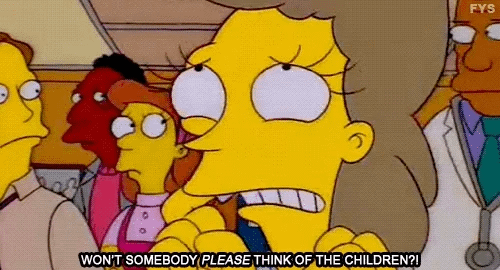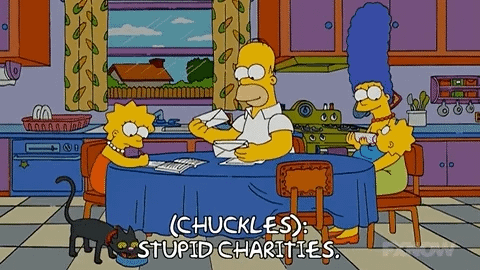We've all heard the phrase.
There's kids dying in Africa.
Obviously, it goes without saying that this is such an offensive and uneducated statement. But that's not why I wanted to mention it this week.
This one sentence is the perfect encapsulation of a problem we have as a nation.
Don't complain because there's someone else worse off than you.
Social media has made this so much worse. People find great solace in shouting into the void. I'm not against that at all. What I am against, or at least not in favour of, is this toxic circle jerk of misery.
We all have struggles. Some struggles are small, while others are big. But who defines the size of the struggle? There's no universal scale of struggle. Like a Richter scale of pain.
That's obviously because struggling is subjective. There are things I find easy that others will find difficult, and vice versa. Of course, there are things that everyone struggles with. Deep and painful experiences that are universal. But even then, the way we experience these struggles is intrinsically unique to us.
So, why does it feel like we have created this strange culture of competitive suffering, particularly online? Tired? You can't be; you don't have kids! Struggling with money? At least you've got a job!
The main issue with this perspective is that it shows a complete lack of empathy for other people. I wrote last week about the role social media played in Liam Payne's death, and this is just a piece of the larger puzzle. If your first thought at witnessing someone else's struggle is to centre your own, then you are failing to connect with others on a human level.
I don't think everyone is doing this. As with everything online, the minority shouts the loudest.
Once we stop being able to recognise that each person is an individual with their own struggles, that's when we've lost our connection.
But why should we care about other people’s suffering, when our own is bad enough?
“Charity begins at home”
I think this happens on two levels - a societal one, and an individual one.
Recently, I saw a news article about pro-Palestine marches in Newcastle city centre and, of course, I stupidly clicked on the comments section. It was a shitshow.
“Charity begins at home” is one of these people’s favourite phrases, inferring that we only have a certain quantity of compassion, and that must be spent on local and national issues before it is sent abroad. It’s funny to me how centuries of colonialism have further intensified this “us vs them” mentality that many British people have. I’ve written about how British, especially English, colonialism past has played into a long-term lack of empathy and narcissism on a national level before:
My own moments of weakness
On an individual level, I think feelings of jealousy and competitive struggle are interlinked. I’ve noticed this in myself since becoming a parent, in particular. I’m not embarrassed to say I’ve found the early years of parenting hard, and this is made significantly more difficult by the fact that I don’t have a strong familial support network to fall back on. I see grandparents everywhere while I am chained to a desk working to pay for nursery.
So, in my weakest moments, I have certainly fallen into a pattern of self-pity. But then I see the developments my daughter has made at nursery, and also I think about all the parents who would love to be at the softplay on a Tuesday afternoon rather than the grandparents, and I am the one who is there because my lifestyle allows that for me.
It’s not as simple as “count your blessings” because simply the knowledge that you are better off than others isn’t enough to fix your own struggles. But equally, taking time away from the screens, and acknowledging what you do have - however small - can truly make all the difference.
We had a rare child-free night on Saturday, so we went into town to see The Substance and have a pizza. The former was hilarious and disgusting, the latter was delicious.
Other than that, I have been either parenting, walking the dogs or building websites.
Other things I’ve also enjoyed this week:
📺Midnight Mass (Netflix) - We were very late to this party, but we finally caught this Netflix show, and it was a perfect spooky October watch.
📽️Woman of the Hour (Netflix) - Anna Kendrick directed and starred in this adaptation of a true serial killer story. What makes this different from other similar pictures is that it focuses heavily on the victims and witnesses, rather than romanticising the killer.
See you next week,
Ellen x
🎧I’m on Spotify!
If you like the audio version of this newsletter, you can listen to them all over on Spotify. Here’s last week’s:
💌 About this email
I’m Ellen, and I write about mental health for the chronically online. I am a freelance copywriter, strategist and web designer, and I work from home with my husband, Craig, at Content By The Sea. We have two rescue greyhounds, Potter and Harmony, and a toddler.
I started this newsletter in March 2020 and have sent over 180 emails; currently, I have over 1,200 subscribers. I write about a wide variety of topics, including diet culture, my love of running, jealousy, my life falling apart, mam guilt, and this dystopian world we all live in.
💛 How you can support me
If you like reading my weekly emails, you can give me a kickback in one or more of the following ways:
📨 Share this post
📬 Subscribe for free (if you haven’t already!)
💬 Leave a comment on this newsletter
💰Sign up to be a paid supporter of the newsletter for just £4 a month or £40 a year.
The current perks of being a paid subscriber are receiving one extra Touching Grass email each month with all of my top films, shows, podcasts and books. Most importantly, you are supporting me in continuing to write this newsletter week after week.









